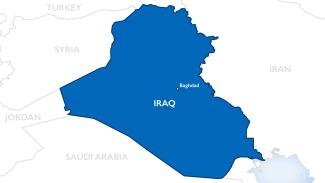
Increasing stability and social cohesion in Iraq.
WHY USAID/OTI IS IN IRAQ
After decades of government dysfunction, the “status quo” Government of Iraq that formed in October 2022—after a yearlong, and at times violent, effort to name a prime minister—has only reaffirmed many Iraqis’ disillusionment with the political system. Additionally, Iraq faces layered crises that pose significant threats to its stability and U.S. interests including ongoing post-ISIS recovery needs, reintegration of internally displaced persons (IDPs), regular anti-government protests in predominantly Shia areas, divisive ethno-sectarian rhetoric, and lack of national unity. These conditions limit the potential for positive change and feed frustration among Iraqis, especially the country’s youth. As the impact of climate change, global inflation, and political paralysis increases, so, too does the risk of violence and instability. OTI helps communities work toward a more pluralistic and cohesive country capable of addressing threats to Iraq’s recovery and stability.
USAID/ OTI’S ROLE IN IRAQ
OTI partners with community groups, civil society organizations (CSOs), and local governments to support a more prosperous and inclusive Iraq. OTI’s geographic focus areas include Ninewa Plain, Mosul, Sinjar, Basra, and Dhi Qar, as well as national-level initiatives. OTI works toward three mutually reinforcing objectives:
- To empower communities to address common concerns;
- To mitigate discrete, emergent challenges that threaten overall stability; and
- To improve basic services, and foster an environment conducive to peacefully reintegrating returnees.
PROGRAM HIGHLIGHTS
- OTI is supporting Iraqis to build broad coalitions around national causes, and mobilize their communities to take action. The climate crisis poses a grave threat to Iraq, one that youth in the country are particularly attuned to and energized to mitigate. Amid a water-scarcity crisis in southern Iraq, OTI provided assistance to a local youth volunteer group to organize a three-day clean-up campaign in the marshlands. With OTI’s support, the youth organization also trained media activists to generate awareness-raising content about the drought nationally in an effort to strengthen grassroots initiatives and elevate the voices of the marshland communities.
- To create an environment conducive to the peaceful reintegration of displaced returnees, OTI partnered with a CSO in Sinjar to train five youth groups to become community advocates. The youth groups also launched community beautification and safety campaigns by painting murals, installing 200 LED streetlights, and implementing other small initiatives as a way to welcome recent returnees and families.
- To strengthen the relationship between communities and their local governments, OTI facilitated 12 consultations between skeptical West Mosul residents and their local representatives. As the last stronghold of ISIS, West Mosul still suffers from destruction caused by the conflict. The sessions provided a space for residents to organize around common issues and directly speak with responsible departments about their concerns with public services. As a result of these sessions, the local government began implementing more than 20 service delivery and infrastructure projects.
